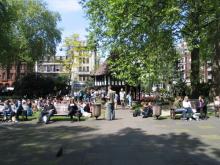public square

The commons was the name for the public space shared by all in New England towns. It is the root of commonwealth, a nice term for an entire civic entity, like a state, in which every citizen is viewed as a stake-holder. Its values are the opposite of those decried in the lament “private wealth and public squalor.” The commons are the opposite of gated communities.
Today, there are two crises of the commons — one on the right and one on the left. One is indifference to the commons, even starving the commons. This means the demise of “social capital” (the sum total of all social networks and human investments in a community or polity) and civic values shared by all, and their surrender to utilitarian individualism and the dominance of the market. The other is the argument over what discourse style is appropriate to the commons — what language should be spoken and what subjects allowed in public life. Hint: lucid rationality is in, religion is out.
Three decades ago, the evangelical faithful was galvanized by public debates over abortion, the size of the federal government, the future of the traditional family, and religious liberty. Many responded by following divisive leaders into the culture wars with the promise that voting for "moral" leadership would end abortion, protect traditional marriage and put our country on the right track.
How did that work? Not so well, it turns out.